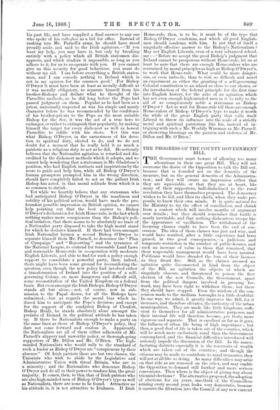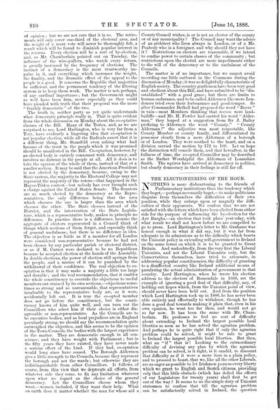THE PROGRESS OF THE COUNTY GOVERNMENT BILL. T HE Government must
beware of allowing too many, alterations in their one great Bill. They will not overcome the desire of the Opposition to talk the Bill out„. because that is founded not on the demerits of the • measure, but on the general demerits of the Administra- tion; and they will create an impression either that they are squeezable, or that they are at heart, like many of their supporters, half-disinclined to the rural revolution they have themselves proposed. The democracy wishes to be led, and likes its chiefs, when they make pro- posals, to know their own minds. It is quite natural for the Ministry to try the effect of conciliation, and shrink from a contest which will involve months of argument over details ; but they should remember that battle is nearly inevitable, and that nothing disheartens troops like the appearance of vacillation. The withdrawal of the licensing clauses ought to have been the end of con-- cession. The idea of those clauses was just and wise, and would have resulted, after a little experience had been. gained, in two good consequences,—a judicious and temperate restriction in the number of public-houses, and such an increase of value in those that remained, that their respectable management would have been assured. Publicans would have dreaded the loss of their licences as they dread fire. Still, as the clauses aroused an agitation quite disconnected in kind from the object of the Bill, an agitation the objects of which are singularly obscure, and threatened to poison the first election of the new Councils, the Government, apart from the political dangers involved in pressing for- ward, may have been right to withdraw them ; but there they should have stopped. Even the wisdom of the con- cession made to the medium boroughs is a little doubtful.. In one way, we admit, it greatly improves the Bill, for it increases, and therefore elevates, the authority of the urban municipalities. They are made like little kingdoms, suffi- cient to themselves for all administrative purposes, and their internal life will therefore become, pro tanto, more vigorous and separate. That is excellent as far as it goes, the fullness of urban life being of high importance ; but then, a good deal of life is taken out of the counties, which will be much more exclusively rural than the Governanent contemplated, and the financial difficulties introduced will. seriously impede the discussion of the Bill. In the manu- facturing districts especially it is the reservoirs of wealth, which are taken out of the counties ; and though the citizens may be made to contribute to rural treasuries, they will not at all like so doing. As many difficulties may arise on that side as are removed on the other, and may enable the Opposition to demand still further and more serious. concessions. Then where is the object of giving way about. triennial elections ? The alternative proposed, the adoption of elections for six years, one-third of the Councillors retiring every second year, looks very democratic, because it ensures the filtration into the Council of any new current of opinion ; but we are not sure that it is so. The retire- ments will only cover one-third of the electoral area, and the weight of a mass vote will never be thoroughly felt, a result which will be found to diminish popular interest in the returns. Every election will be a sort of by-election, and, as Mr. Chamberlain pointed out on Tuesday, the influence of the wire-pullers, who watch every return, is greatly increased by the frequency of elections. The instinct of a democracy is the most trustworthy im- pulse in it, and everything which increases the weight, the finality, and the dramatic effect of the appeal to the people is a good. It concerns the Republic that majorities be sufficient, and the permanent tendency of the filtering system is to keep them weak. The matter is not, perhaps, of any cardinal importance ; but the Government might as well have been firm, more especially as they could have pleaded with truth that their proposal was the more "frankly democratic" of the two. The truth is, neither party as yet quite understands what democratic principle really is. That is quite evident from the whole discussion on Monday about the co-optative clauses of the Bill. Many of the Tories, and, as we are surprised to see, Lord Hartington, who is very far from a Tory, have evidently a lingering idea that co-optation is not popular election, while all the Radicals assert that it is a different thing, Mr. Stansfeld even asking what had become of the trust in the people which it was promised should be manifested in the Bill. Co-optation, however, by an elected body is entirely consonant with democracy, and involves no distrust in the people at all. All it does is to take the opinion of the whole of them, instead of that of a smaller section. It may be said that the American President is not elected by the democracy, because, owing to the State system, the majority in the Electoral College may not represent the majority of the voters—that happened in the Hayes-Tilden contest—but nobody has ever brought such a charge against the United States Senate. The Senators are as much elected by the democracy as the Repre- sentatives, the only difference being that the area which chooses the one is larger than the area which chooses the other. The State chooses instead of the District, and the intervention of the State Legisla- ture, which is a representative body, makes in principle no difference. In practice there is a difference, because the aggregate of electors represented in a Council think of things which sections of them forget, and especially think of general usefulness ; but there is no difference in idea. The objection is as futile as if a member for all London were considered non-representative because he had not been chosen by any particular parish or electoral district, or as if M. Carnot were declared to be no Republican because he accepted election at the hands of the Assembly. In double elections, the power of election still springs from the people, and a misuse of it can be punished by the withdrawal of their confidence. The real objection to co- optation is that it may make a majority a little too large and durable ; and the real recommendation, that it enables the whole constituency to override the objections to useful members entertained by its own sections,—objections some- times so strong and so unreasonable, that representatives invaluable to the representative body are, as it were, accidentally left out. It is true the co-opted member does not go before the constituency, but the consti- tuency knows of him quite well, and can turn out the Councillors who select him if their choice is either dis- agreeable or non-representative. As the Councils are to be executive bodies, and as local prejudices are in England peculiarly strong, we should say the recommendation quite outweighed the objection, and this seems to be the opinion of the Town Councils, the bodies with the largest experience in the matter. They are democratic enough in all con- science, and they have weight with Parliament ; but in the fifty years they have existed, they have never made a serious effort of the kind. If they had, co-optation would long since have ceased. The Borough Aldermen give a little strength to the Councils, because they represent the borough and not the wards ; but otherwise they are indistinguishable from other Councillors. It follows, of course, from this 'new that we deprecate all efforts, from whatever side they come, to fix any limitation whatever upon what we regard as the choice of the general democracy. Let the Councillors choose whom they want,—women included, if they want their help. What on earth does it matter whether the man for whose aid a County Council wishes, is or is not an elector of the county or of any municipality ? The Council may want the advice of an architect who lives always in London, or of a Mr. Peabody who is a foreigner, and why should they not have it ? Restrictions on erectors are reasonable, if we intend to confine power to certain classes of the community ; but restrictions upon the elected are mere impediments either to the will of the democracy or to the usefulness of the Councils.
The matter is of no importance, but we cannot avoid recording one little outburst in the Commons during the discussion of Monday; it was so delightfully characteristic of English society. The country gentlemen have been very good and obedient about this Bill, and have submitted to be " dis- established " with a good grace; but there are limits to human endurance, and to be called Aldermen like mere Lon- doners tried even their forbearance and good-temper. So after Commander Bethel had proposed the word " Reeve " in vain—most Members thinking that reeves were land- bailiffs—and Mr. H. Fowler had carried his word "Alder- man," they leaped at a suggestion from Sir J. Bailey prefixing to Aldermen the word "County." "County Alderman l" the adjective was most respectable, like County Member or county family, and differentiated its possessor clearly from a mere Alderman of a borough or of London. They were soothed to the heart, and on a division carried the motion by 172 to 109. Let us hope the distinction will console them, and that hereafter, in the fullness of time, the co-opted Councillor may be described as the Rather Worshipful the Alderman of Loamshire Smith. The squires have arrived at democracy in politics, but clearly democracy in their feelings is still far off.



































 Previous page
Previous page